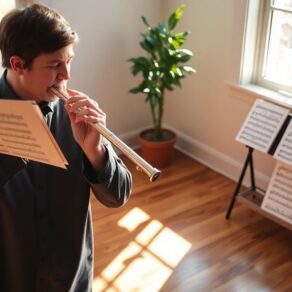When you explore classical flute music, you uncover a world rich in history and emotion. From Bach's expressive sonatas to Mozart's vibrant concertos, each piece reflects a unique artistry. You'll notice the flute's airy timbre and lyrical lines, which evoke feelings ranging from joy to melancholy. Techniques like breath control and articulation create a enchanting sound, while renowned performers like Jean Pierre Rampal and James Galway enhance the experience with their virtuosity. As you listen, consider how these compositions resonate with your emotions, revealing the timeless beauty of this instrument. There's much more to discover about its profound artistry and impact.
Key Takeaways
- Classical flute music showcases a rich history, with roots in ancient cultures and significant contributions from composers like Bach and Mozart.
- The flute's airy timbre and lyrical lines enable it to convey a wide range of emotions, enhancing listener engagement.
- Mastery of techniques such as breath control and articulation allows flutists to express profound artistry and technical skill in their performances.
- Notable performers like Jean Pierre Rampal and James Galway have elevated the flute's status, inspiring new generations of musicians with their unique styles.
- The intimate connection between performer and audience fosters a personal experience, making flute music a powerful medium for emotional expression.
The History of Flute Music
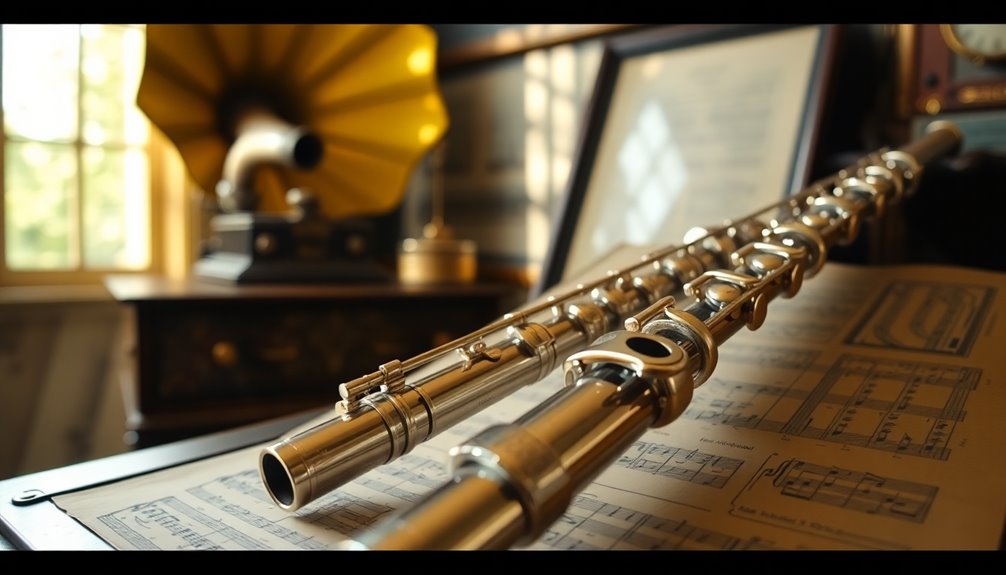
Although the flute has evolved considerably over centuries, its rich history showcases its enduring appeal in classical music. You might be surprised to learn that the flute's ancient origins trace back thousands of years, with evidence of similar instruments found in various cultures, from the Indus Valley Civilization to ancient Egypt.
These early flutes, often made from bone or bamboo, served not only as musical instruments but also as essential components of rituals and celebrations, reflecting their cultural significance.
As you investigate deeper into the history of flute music, you'll discover how the instrument has transformed across different eras. In the Baroque period, the flute gained prominence, with composers like Bach and Handel incorporating it into their works, pushing its expressive capabilities.
During this time, the instrument's design evolved, leading to the creation of the traverso, a wooden flute that offered a warmer tone, allowing musicians to explore a wider range of emotions. This evolution is part of a broader narrative that illustrates the development of sophisticated designs in flute history, enhancing its role in music cultures worldwide.
Techniques for Flute Mastery
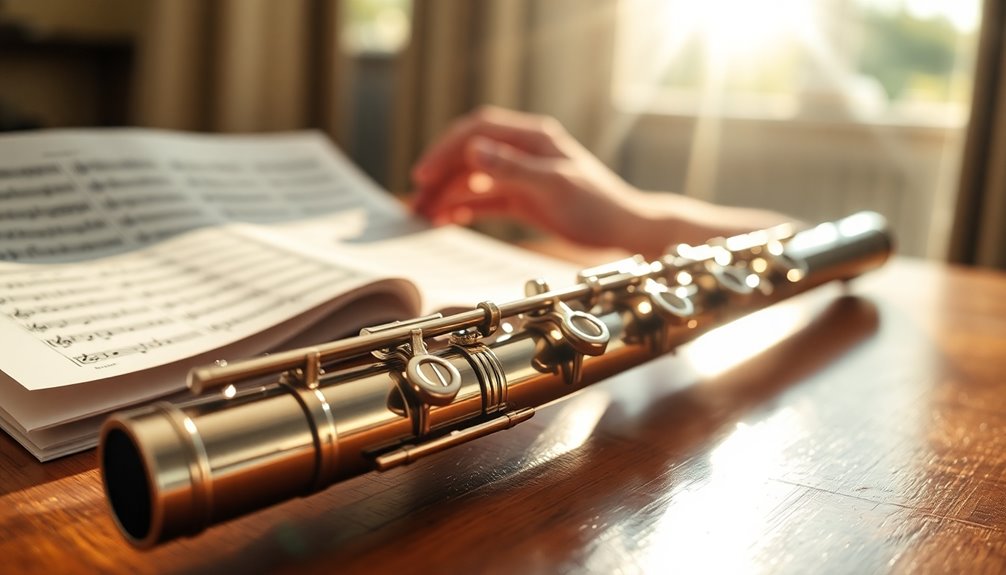
Mastering the flute requires dedication and a keen understanding of various techniques that enhance your playing. To truly excel, you'll want to focus on specific aspects that can elevate your performance to new heights.
Here are some essential techniques to take into account:
- Breath Control: This is the foundation of your sound. Mastering breath control allows you to sustain notes longer and produce a full, rich tone. Practice exercises that develop your ability to regulate airflow and learn how to coordinate your breathing with your phrasing. Additionally, incorporating diaphragmatic breathing techniques can significantly improve your tone quality and overall performance.
- Finger Placement: Proper finger placement is vital for speed and accuracy. Verify your fingers are relaxed and positioned correctly on the keys. Regular practice of scales and arpeggios can help reinforce muscle memory, making shifts smoother during complex passages.
- Articulation: The way you articulate notes impacts the clarity and expressiveness of your music. Experiment with different tonguing techniques, such as legato and staccato, to find what best suits your style.
Notable Composers and Works
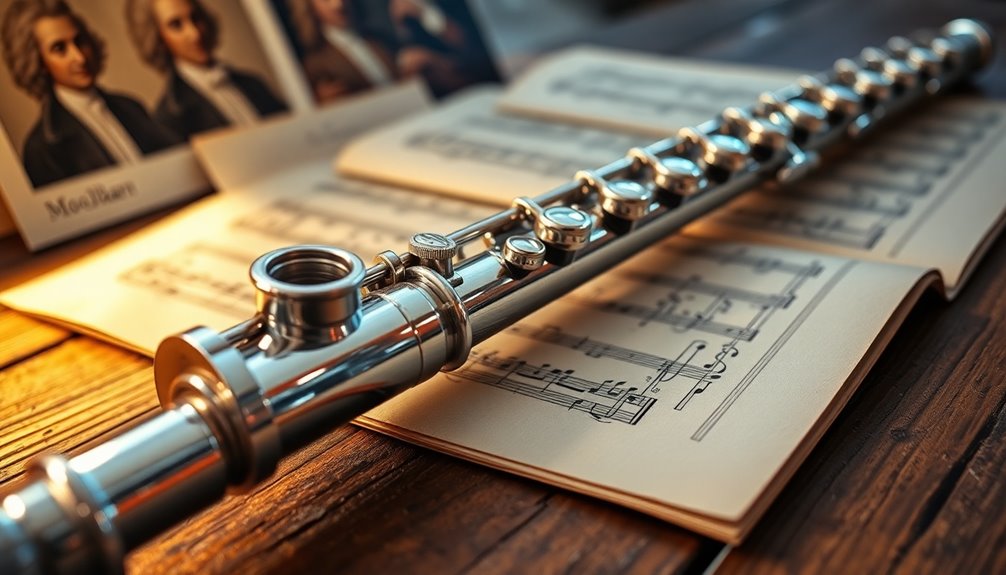
The world of classical flute music is rich with contributions from remarkable composers who've shaped the instrument's repertoire. Among these, Johann Sebastian Bach stands out, particularly for his flute sonatas, which exemplify the Baroque influences that permeate his work. Bach's compositions not only demand technical finesse but also invite you to explore deep emotional landscapes.
His Sonata in A Major, for instance, showcases the flute's lyrical capabilities, blending intricate melodies with harmonic depth.
Another pivotal figure is Wolfgang Amadeus Mozart, whose flute concertos and sonatas continue to resonate today. Mozart infused his works with a sense of joy and spontaneity, creating pieces that feel both intimate and grand.
His Flute Concerto No. 1 in G Major is a stunning example, allowing flutists to express their virtuosity while maintaining an engaging dialogue with the orchestra.
Then there's Claude Debussy, who, while not strictly a Baroque composer, drew upon its influences to enrich his own style. His "Syrinx" for solo flute is a revolutionary piece that broke away from traditional forms, inviting listeners into a world filled with impressionistic colors and textures.
These composers and their works provide a foundation for understanding the flute's evolution in classical music. As you immerse yourself in their compositions, you'll find a sense of belonging within a rich tradition, one that continues to inspire flutists and audiences alike. Additionally, exploring different classical genres can further enhance your appreciation and adaptability as a flutist.
Famous Flute Performers
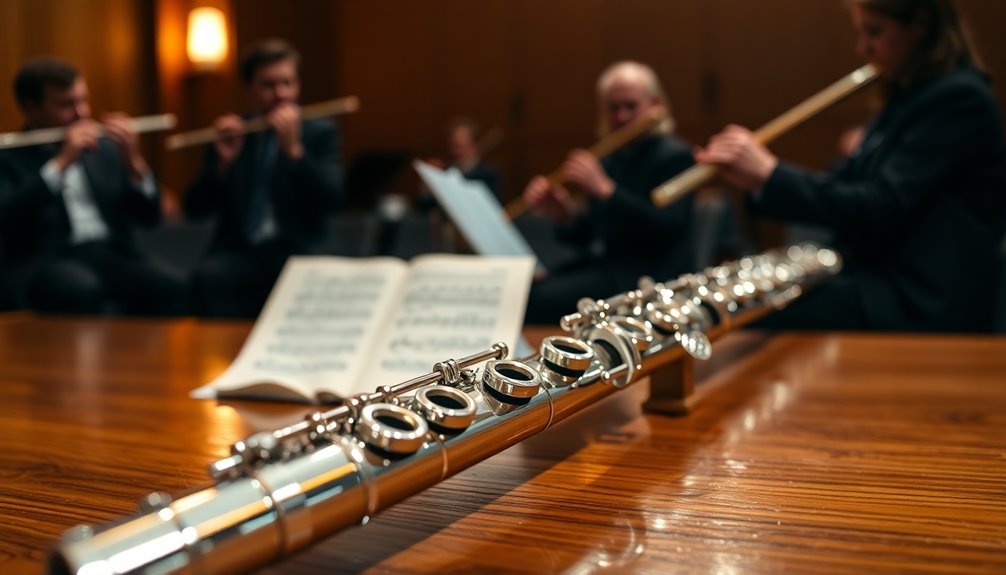
In the domain of classical flute music, renowned performers have brought the instrument's repertoire to life, enchanting audiences with their skill and artistry. Two names that resonate deeply within this sphere are Jean Pierre Rampal and James Galway, each contributing uniquely to the flute's legacy.
- Jean Pierre Rampal: The pioneer who popularized the flute as a solo instrument.
- James Galway: The "Man with the Golden Flute," known for his enthralling performances and charm.
- The impact of these artists on contemporary flute music and education.
Rampal's influence in the 20th century was transformative. He not only showcased the flute's versatility but also expanded its repertoire, performing works from baroque to contemporary composers. His exquisite tone and technical prowess elevated the instrument, making it a staple in concert halls worldwide.
You can feel the passion in his interpretations, which seem to breathe life into each note.
Then there's James Galway, whose charismatic stage presence and virtuosic skill have made him a beloved figure in classical music. Galway's ability to connect with audiences through storytelling in his performances creates an inviting atmosphere, drawing you into the musical experience.
His interpretations of both classical pieces and traditional Irish folk tunes reveal a deep respect for the flute's rich history.
Together, Rampal and Galway exemplify the heights of flute artistry, inspiring countless musicians and listeners alike to appreciate the beauty and depth of classical flute music. Their legacies remind us of the instrument's potential to evoke emotion and create a sense of belonging in the world of music.
Moreover, the techniques they employed, such as advanced flute techniques, have influenced many aspiring flutists aiming to enhance their skills.
The Emotional Impact of Flute Music
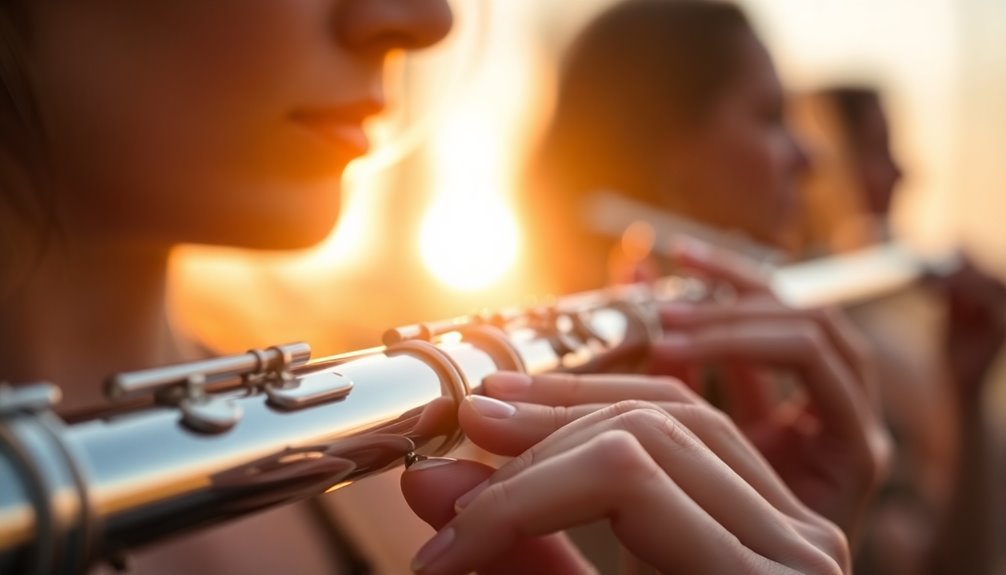
Throughout history, flute music has stirred deep emotional responses in listeners, creating connections that transcend mere sound. When you listen to an expressive melody, it often feels as if the music is speaking directly to your soul. The flute, with its airy timbre and lyrical lines, has a unique ability to evoke feelings ranging from profound joy to deep melancholy. This emotional depth is what makes flute music so enchanting.
As you immerse yourself in a piece, notice how the gentle rise and fall of the notes can mirror your own emotional landscape. The flute's flexibility allows it to convey a wide spectrum of emotions, drawing you in and inviting you to reflect on your own experiences. Each note can resonate with your thoughts and feelings, creating a sense of belonging as you connect with the music on a personal level.
The beauty of flute music lies in its capacity to forge a soul connection between you and the performer. Each expressive melody becomes a shared moment, where the musician's intent meets your interpretation. This interplay creates an intimate atmosphere, allowing you to feel understood and less alone in your emotions.
As you continue to explore classical flute music, let the melodies wash over you, guiding your emotional journey. Embrace the vulnerability that comes with listening, and allow yourself to be moved by the music's power to connect hearts and minds across time and space. Additionally, the intricate melodies and delicate phrasing found in classical flute solos highlight the instrument's artistry and technical skill, enhancing the emotional experience for listeners.
Frequently Asked Questions
What Are the Different Types of Flutes Used in Classical Music?
In classical music, you'll encounter various types of flutes, each adding a unique flavor to compositions.
The concert flute, often made of metal, shines in orchestras, while wooden flutes offer a warmer tone, perfect for chamber music.
You might also hear the bright, high-pitched piccolo flute, the deeper alto flute, and the rich bass flute, which brings a profound depth.
Each type serves its purpose, enriching the musical experience and inviting connection.
How Can I Choose a Flute for Beginners?
Choosing a flute for beginners can feel overwhelming, but it doesn't have to be.
Start by researching reputable flute brands like Yamaha or Gemeinhardt, known for their quality and affordability.
Consider beginner tips such as trying out different models to find the one that feels comfortable in your hands.
Pay attention to the weight and key placement.
Ultimately, select a flute that resonates with you, ensuring a more enjoyable learning experience.
What Is the Average Cost of a Classical Flute?
On average, a classical flute can cost between $300 and $1,500, depending on the flute brands you're considering.
Curiously, around 80% of beginner flutists opt for more affordable models to start their journey.
As you explore different options, don't forget to factor in flute accessories like cleaning kits and cases, which can enhance your playing experience and protect your investment, making you feel more connected to the music you love.
Where Can I Find Sheet Music for Flute Compositions?
You can find sheet music for flute compositions at various online resources.
Websites like IMSLP and MusicNotes offer extensive collections, catering to different skill levels.
You might also explore dedicated flute composition websites, where you'll discover unique arrangements and contemporary pieces.
Joining online communities or forums can also connect you with fellow flutists who share their recommendations.
With these resources, you'll enhance your repertoire and deepen your connection to the flute community.
Are There Online Resources for Learning Flute Techniques?
Imagine a digital age where musicians gather in virtual spaces, sharing knowledge like ancient bards.
You'll find a treasure trove of online resources for mastering flute techniques. Websites like YouTube and specialized music platforms offer countless tutorials that break down complex skills into manageable steps.
Engaging with these tutorials not only hones your technique but also connects you with a community of fellow flutists, fostering a sense of belonging and shared passion.
Conclusion
In exploring classical flute music, you've uncovered a vibrant tapestry woven with history, technique, and emotion. Each note dances like a whisper in the wind, inviting you to connect deeply with the artistry. As you listen to the works of renowned composers and performers, let the flute's voice resonate within you, stirring memories and feelings. Embrace this journey; it's not just about mastery, but also about experiencing the profound beauty that only flute music can offer.





